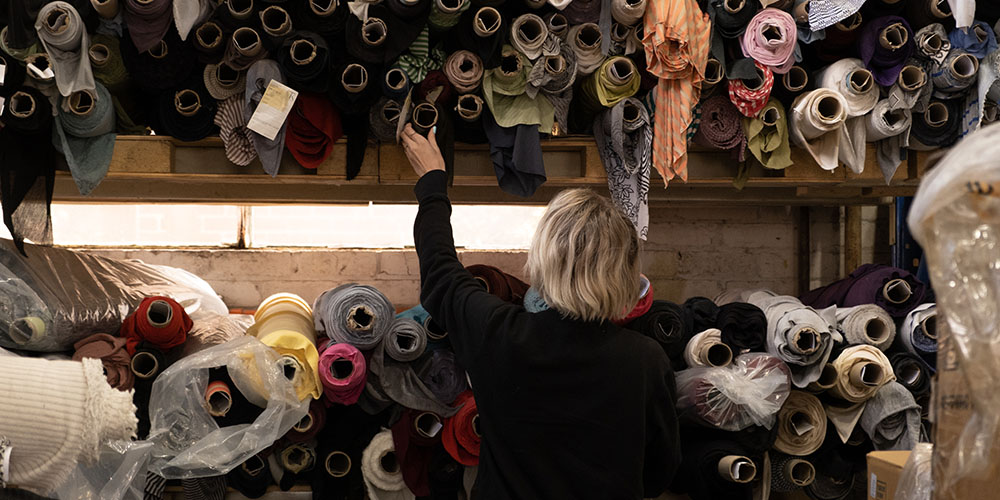Doing business differently for a sustainable future
To be ready for a future shaped by climate change, Victoria needs to do business differently, and avoiding waste is a critical change we need to make.
Innovative Victorian businesses are already reducing waste and saving money by testing new approaches to sustainability, transforming the way they use resources and developing new business models.
It’s all part of our transition from a linear, throw-away economy to a circular economy where waste as we know it is eliminated, and we use resources again and again to get their maximum value. Not only does avoiding waste help reduce landfill, it also is critical if we are to reduce emissions: 45% of our global emissions are generated from how we extract and use materials.

Diagram demonstrating the circular economy concept. Source: Wikimedia Commons.
It’s estimated that being just 5% more efficient with our materials could boost the Victorian economy by $6.4 billion.
Eliminating waste is good business, and it's why Sustainability Victoria has fast-tracked more than 200 new circular products and services through its Circular Economy Business Innovation Centre.
Through Sustainability Victoria’s grants, education and support to develop collaborative partnerships, hundreds of Victorian businesses are saving money, future-proofing their operating models, and finding a competitive edge through smarter, circular, and more sustainable ways of doing business.
Here are some great examples of how Victorian businesses are doing just that.
New products on the menu for Australia’s biggest olive oil producer
The process of producing olive oil generates a lot of waste, with olive pits, skin and flesh left over.
Cobram Estate received funding to build an industry-first facility to recycle up to 28,000 tonnes of olive waste each year into new products like animal feed and soil conditioner.
It’s one of 11 projects Sustainability Victoria funded to tackle food waste that are set to make a real impact. Together they’re projected to reduce or recycle food waste by 40,280 tonnes each year and contribute 4.2% toward Victoria’s target to halve food waste by 2030.
Read ‘Food waste that’s good enough to eat’ on the Sustainability Victoria website.
Small business entrepreneurship powered by electric vehicle waste
Batteries from electric vehicles have to be replaced after just 20-30% of their capacity has been used, or after about 10 years. One Victorian business has turned this problem into an opportunity.
Rather than letting them go to waste, Infinitev is refurbishing the batteries so they can be used in cars again. When a battery is too far gone, Infinitev will transform it into an energy storage system to collect excess electricity from commercial solar panels.
Infinitev can also extract valuable materials from old batteries and use them to create new batteries, reducing our reliance on virgin resources like lithium and nickel.
Read ‘Watt’s next for old EV batteries’ on the Sustainability Victoria website.
Squid gut science key to better business in fisheries
A significant amount of waste is generated in the processing of seafood, posing challenges for wild-harvest fisheries, processors, and aquaculture industries.
More than one-third of a squid is considered waste, even though this material contains up to 12% omega-3 oil and is high in protein.
A partnership with Deakin University has helped Mantzaris Fisheries to repurpose this waste through science. They’ve joined forces to develop a process that separates the squid guts from the valuable oil, leaving a material that could be used in health supplements or premium dog food.
It’s just one of almost 200 collaborations formed as part of Sustainability Victoria’s support for circular business.
Read ‘Investing in blue-sky thinking to support a circular future’ on the Sustainability Victoria website.
Textile manufacturing waste is back in fashion
The Victorian fashion industry is wasting up to 10 million kilos of leftover fabric from the manufacturing process, which is worth $500 million.
Circular fashion label ABC.H used a Sustainability Victoria grant to develop a digital marketplace for buying and selling quality Australian surplus fabrics.
Participating brands are not just recouping costs: they’re meeting customer expectations around environmental sustainability which gives them an edge over their competitors.
Read ‘Circular business trends cutting costs for the fashion industry’ on the Sustainability Victoria website.
Sustainability, the cherry on top for one farming business
In Victoria alone, we waste 3,000 tonnes of cherries every year, which is enough to fill around 41,000 shopping trolleys.
The team at Cathedral Cherries has paired up with former chef Sam Bate to repurpose this waste into commercially viable, high-end consumer products like cider, vodka, vinegar and cherry honeycomb.
Read ‘Another bite of the cherry’ on the Sustainability Victoria website.
Learn more
Sustainability Victoria is proud to be providing these Victorian businesses with funding, tools, expertise and networks to fast-track impactful solutions that are good for our environment and our economy.
Find out how Sustainability Victoria can help your business become more sustainable and cut costs by reducing waste on its website's Innovation and Investment section.